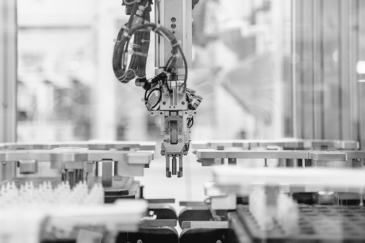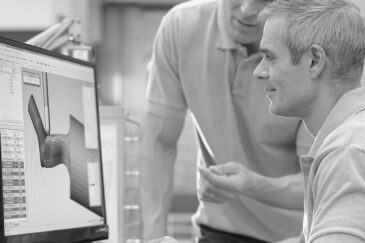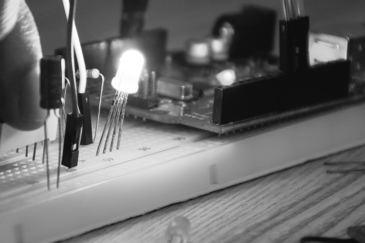Benjamin Finio is a lecturer in the Sibley School of Mechanical and Aerospace Engineering at Cornell University, where he teaches MAE 3780: Mechatronics. Dr. Finio has a B.S. in mechanical engineering from Bucknell University and a Ph.D. in Engineering Sciences from Harvard University, where he completed his thesis on the “Robobee” project in the Harvard Microrobotics Lab. He has experience teaching students of all ages, both online and in person, as well as designing electronics and robotics kits for both K-12 and college-level curricula. In addition to teaching at Cornell, Dr. Finio works for a science education website (Science Buddies), where he has written for Scientific American and made educational YouTube videos that have been viewed millions of times by people around the globe.
Request More Info
Overview and Courses
From smart home devices to drones, robots, and autonomous cars, we are surrounded by electronic devices that are increasingly ingrained into our daily lives. Mechatronics is a rapidly growing field that encompasses the inner workings of these devices.
In this certificate program, you will prototype your own device, applying best practices at every step in the process from design to pitching, assembling, and reporting. A leading expert from Cornell’s College of Engineering will guide you through both the theoretical basis for the concepts and the technical skills, including circuit construction, microcontroller programming, the application of sensors and actuators, and the use of professional-grade test equipment. Equipped with a kit of electrical components, you will dive into the building blocks of various mechatronic systems. You will discover how to program a microcontroller in C then program and control sensors and actuators to build circuits that interact with the physical world. By the final course, you will have gained a strong foundation for your capstone project: prototyping a design from start to finish.
This program requires the purchase of a kit of electronic components and microcontrollers at a cost of around $600. Once you enroll in the program, you will be sent an email that provides the specific details on where to purchase the kit. To be successful in these courses, you should have some programming experience (any language) and familiarity with basic circuit theory (at the level of a high school or introductory college physics course).
To avoid delays in starting your first course, please register at least two weeks before your intended start date and provide a valid shipping address during registration. This will ensure the timely delivery of your kit and a smooth start to your learning experience. While course and certificate fees are refundable, the kit fee is not refundable once shipped.
The courses in this certificate program are required to be completed in the order that they appear.
Course list
In this course, you will receive a blend of introductory information and practical hands-on experience to orient you to the world of mechatronics. You will design, assemble, and analyze your own simple circuits. You will also learn to set up a microcontroller, which will provide you with tools to use for the rest of the courses. This introduction to circuits and their basic functionality will provide a solid base for you to grow, both throughout this certificate program and beyond.
In order to complete the activities in this course, you must be able to download and install the Arduino IDE on your computer. The kit purchased as part of this certificate program will provide you with the physical materials you will need to complete your assignments. You will need to provide your own computer.
This program requires the purchase of a kit of electronic components and microcontrollers at a cost of around $600.
- Mar 25, 2026
- Jun 17, 2026
- Sep 9, 2026
- Dec 2, 2026
In this course, you will explore circuits whose behavior varies with time. These circuits have a variety of useful applications, and you will learn about both their theoretical design using mathematical circuit analysis and practical circuit assembly. You will also be introduced to a new and incredibly useful tool for analyzing circuits, the oscilloscope. By the end of the course, you will build a practical circuit to complete a specific task without requiring use of a microcontroller. This course will give you a wealth of experience that will be useful as you move toward doing your own open-ended projects.
This program requires the purchase of a kit of electronic components and microcontrollers at a cost of around $600.
You are required to have completed the following course or have equivalent experience before taking this course:
- Building and Analyzing a Basic Circuit
- Apr 8, 2026
- Jul 1, 2026
- Sep 23, 2026
- Dec 16, 2026
Learning to program a microcontroller is a crucial skill in the world of mechatronics. Microcontrollers allow you to make circuits that interact with the physical world around them via sensors (which gather data from the surrounding environment) and actuators like motors (which can affect the environment). In this course, you will learn the basic microcontroller functionality required to control inputs and outputs using simple hardware like buttons and LEDs, including an "under the hood" look at how the microcontroller works. The programming concepts you learn in this course will set the stage for controlling more advanced hardware like sensors and motors in future courses and projects.
This program requires the purchase of a kit of electronic components and microcontrollers at a cost of around $600.
You are required to have completed the following courses or have equivalent experience before taking this course:
- Building and Analyzing a Basic Circuit
- Building and Measuring a Time-Varying Circuit
- Apr 22, 2026
- Jul 15, 2026
- Oct 7, 2026
- Dec 30, 2026
Motors are a key part of most mechatronic systems. They surround us in the devices we use every day, ranging from the tiny vibration motors in cell phones to the large motors in household appliances. Learning about different types of motors, and how to interface them with a microcontroller to control them, is an important skill that will allow you to build a variety of devices. In this course you will learn how to use and control three different types of motors commonly used in electronic devices. This will prepare you for using these motors in your own projects and other applications outside the classroom.
This program requires the purchase of a kit of electronic components and microcontrollers at a cost of around $600.
You are required to have completed the following courses or have equivalent experience before taking this course:
- Building and Analyzing a Basic Circuit
- Building and Measuring a Time-Varying Circuit
- Programming a Microcontroller
- May 6, 2026
- Jul 29, 2026
- Oct 21, 2026
In this course, you will learn to use a variety of sensors that can measure quantities or variables from the surrounding physical environment – such as the movement of a person or animal, the distance to a nearby object, or the amount of ambient light. Accomplishing this requires learning how to get relevant information from a sensor's datasheet and write appropriate microcontroller programs to get data from the sensor in a usable form. Learning to use sensors will allow you to build devices that are interactive and react to the physical world – a valuable skill when designing mechatronic systems.
This program requires the purchase of a kit of electronic components and microcontrollers at a cost of around $600.
You are required to have completed the following courses or have equivalent experience before taking this course:
- Building and Analyzing a Basic Circuit
- Building and Measuring a Time-Varying Circuit
- Programming a Microcontroller
- Using and Controlling Motors
- Mar 11, 2026
- May 20, 2026
- Aug 12, 2026
- Nov 4, 2026
In this course, you will synthesize everything you have learned so far to design and build a mechatronic system of your choice. You will need to apply what you have learned about circuits, microcontrollers, sensors, and actuators to build a device that reacts to the user or its physical environment somehow. You will need to apply your design, problem solving, and debugging skills to iterate and improve upon your project. Finally, you will document your project – you will provide technical documentation including commented code, circuit diagrams, and assembly instructions, and a video that shows off your final design. You are welcome and encouraged to add these materials to your professional portfolio or show them off outside of this course.
This program requires the purchase of a kit of electronic components and microcontrollers at a cost of around $600.
You are required to have completed the following courses or have equivalent experience before taking this course:
- Building and Analyzing a Basic Circuit
- Building and Measuring a Time-Varying Circuit
- Programming a Microcontroller
- Using and Controlling Motors
- Collecting Data with Sensors
- Mar 25, 2026
- Jun 3, 2026
- Aug 26, 2026
- Nov 18, 2026
Request more Info by completing the form below.
How It Works
- View slide #1
- View slide #2
- View slide #3
- View slide #4
- View slide #5
- View slide #6
- View slide #7
- View slide #8
- View slide #9
Faculty Author
Key Course Takeaways
- Design, build, measure, and analyze a simple circuit
- Assemble time-varying circuits, using formulas and tools to predict their behavior
- Build an Arduino circuit with inputs and outputs
- Build and program circuits to control three common types of motors
- Integrate sensors into a circuit, collecting data from the sensors and programming the circuit to act based on sensor input
- Complete a prototype from start to finish, including design, pitch, assembly, and reporting

Download a Brochure
Not ready to enroll but want to learn more? Download the certificate brochure to review program details.

What You'll Earn
- Mechatronics Certificate from Cornell Duffield College of Engineering
- 96 Professional Development Hours (9.6 CEUs)
Watch the Video
Who Should Enroll
- Engineers (mechanical, software, civil, systems, chemical, biomedical)
- Robotics and automation technicians
- Programmers and computer scientists
- Technology researchers
- High school teachers
- Hobbyists
Explore Related Programs
Request Information Now by completing the form below.

Mechatronics
| Select Payment Method | Cost |
|---|---|
| $3,750 | |
























